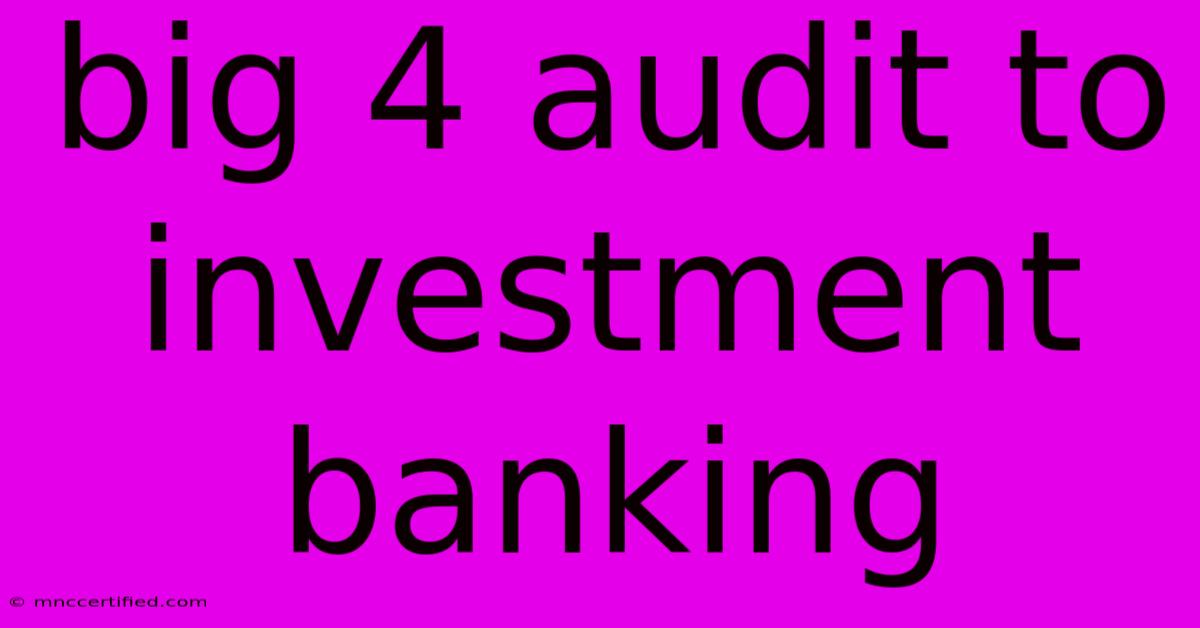Big 4 Audit To Investment Banking

Table of Contents
From Big 4 Audit to Investment Banking: A Career Path Guide
The transition from a Big 4 audit role to investment banking is a popular and challenging career move. Many aspiring finance professionals see it as a significant step up, offering higher earning potential, more client interaction, and a faster-paced, more dynamic work environment. However, it's not a straightforward path. This article will guide you through the key aspects of making this transition successfully.
Understanding the Differences: Audit vs. Investment Banking
Before diving into the transition process, it's crucial to understand the fundamental differences between audit and investment banking.
-
Audit: Focuses on ensuring the accuracy and fairness of financial statements. It's detail-oriented, analytical, and often involves long hours during peak seasons. Key skills developed include meticulous attention to detail, analytical skills, and understanding financial statements.
-
Investment Banking: Involves advising companies on mergers and acquisitions (M&A), raising capital through equity and debt offerings, and providing financial advisory services. It's fast-paced, demanding, and requires strong communication and networking skills. Key skills needed include financial modeling, valuation, pitching, and client relationship management.
Why Make the Switch?
Many auditors choose to move to investment banking for several compelling reasons:
- Higher Compensation: Investment banking generally offers significantly higher salaries and bonuses than audit.
- More Dynamic Work: The work is more stimulating and less repetitive than the often cyclical nature of audit.
- Client Interaction: Investment banking offers more direct interaction with clients and the opportunity to build stronger relationships.
- Career Progression: Investment banking often provides faster career progression and opportunities for advancement.
- Skill Diversification: The skills gained in audit, particularly financial statement analysis, are highly valuable in investment banking.
Bridging the Gap: Key Steps for a Successful Transition
Transitioning from audit to investment banking requires strategic planning and effort. Here's a breakdown of the crucial steps:
1. Networking: The Unsung Hero
Networking is paramount. Attend industry events, connect with investment banking professionals on LinkedIn, and reach out to your alumni network. Informational interviews are invaluable for gaining insights into the industry and building relationships. Highlight your transferable skills, such as analytical abilities and financial statement expertise.
2. Skill Enhancement: Sharpen Your Tools
While audit provides a solid foundation, you'll need to enhance your investment banking-specific skills. This includes:
- Financial Modeling: Master Excel and learn to build sophisticated financial models for valuations and M&A analyses. Consider taking online courses or workshops.
- Valuation: Develop a strong understanding of different valuation methodologies, including discounted cash flow (DCF) analysis.
- Accounting Knowledge: Deepen your accounting knowledge beyond the basics. A strong grasp of US GAAP or IFRS is crucial.
- Pitching and Presentation Skills: Practice delivering compelling presentations and perfecting your communication skills.
3. Targeting the Right Roles: Analyst or Associate?
Entry-level investment banking roles are typically Analyst positions, although some firms may offer Associate roles to experienced professionals with a strong background and demonstrable skills. Tailor your resume and cover letter to the specific requirements of each role.
4. Resume and Cover Letter Optimization: Showcasing Transferable Skills
Your resume and cover letter are critical. Highlight your analytical skills, attention to detail, and experience with financial statements. Quantify your achievements whenever possible and showcase projects where you demonstrated initiative and problem-solving abilities. Emphasize any experience with financial modeling or valuation, even if it was part of your audit work.
5. Ace the Interview: Preparation is Key
Investment banking interviews are notoriously rigorous. Prepare for technical questions related to accounting, finance, and valuation. Practice your behavioral interview responses, focusing on situations where you demonstrated leadership, teamwork, and problem-solving.
Leveraging Your Audit Experience: A Competitive Advantage
Your audit experience isn't a disadvantage; it's an asset. Many investment banks value the strong analytical and financial statement expertise gained in Big 4 audit firms. Frame your audit experience to highlight these transferable skills and showcase how they align with the requirements of an investment banking role.
Conclusion: A Rewarding but Demanding Journey
The transition from Big 4 audit to investment banking is a challenging but potentially highly rewarding career move. By strategically planning, enhancing your skills, and effectively networking, you can significantly increase your chances of success. Remember, persistence and dedication are key to navigating this competitive path. Good luck!

Thank you for visiting our website wich cover about Big 4 Audit To Investment Banking. We hope the information provided has been useful to you. Feel free to contact us if you have any questions or need further assistance. See you next time and dont miss to bookmark.
Featured Posts
-
Stellate Ganglion Block Insurance
Nov 20, 2024
-
South Dakota Motorcycle Insurance
Nov 20, 2024
-
Are Gold Chains A Good Investment
Nov 20, 2024
-
Best Cartier Watch For Investment
Nov 20, 2024
-
What Is A Maximum Investment Plan
Nov 20, 2024